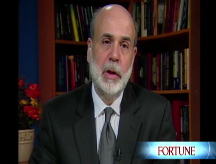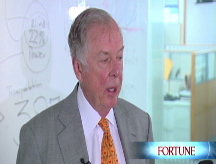Tough love from Bernanke
By declaring war on inflation, the Fed signals it can't be there to hold investors' hands through the rest of the credit crisis.
NEW YORK (Fortune) -- Note to investors: Ben Bernanke isn't your best friend anymore.
After spending nine months cutting interest rates and lending freely to financial firms in a bid to ease the pain of the credit crunch, the Federal Reserve has reversed course. Bernanke and other Fed officials have signaled in recent weeks that the Fed now sees fighting inflation, rather than preventing a severe economic slowdown, as its top priority.
"The risk that the economy has entered a substantial downturn appears to have diminished over the past month or so," Bernanke said this week at a conference in Boston. "The Federal Open Market Committee will strongly resist an erosion of longer-term inflation expectations."
The switch was welcomed by dollar hawks, who have long warned that Bernanke's easy-money stance, coming as it did in the wake of stock- and housing-market bubbles that inflated on the watch of his predecessor Alan Greenspan, tempted a return to the inflationary haze of the 1970s. The surging price of crude oil, lately $136 a barrel, has only added to those fears. Even within the Fed, Bernanke's aggressive easing had raised hackles: The last two Fed interest-rate cuts were made, unusually, over the objections of two members of the policy-setting Federal Open Market Committee.
Currency markets roared their approval of Bernanke's strong comments by sending the dollar, which has been in steep decline since 2002, higher against the euro. But with developed economies slowing and bank balance sheets in disarray, even strong-dollar talk isn't cheap. While Bernanke has been striking a hopeful tone about the economy - he said this week he believes interest-rate cuts and tax-rebate checks should help mitigate the effect of the housing bust in the second half of 2008 - the action in the stock and bond markets shows that many investors have been tripped up by the tough words from the Fed.
"The immediate effect from this dramatic shift in policy priorities has been to 'drain' visibility, confidence and liquidity from financial markets," Tullett Prebon economist Lena Komileva wrote this week. "With monetary policy adopting the role of a risk-driver rather than a source of relief for financial markets, current conditions are actually worse than they were last August when the credit crunch erupted."
The increased fear has been plainly visible throughout the financial sector. The yield on two-year Treasury bonds posted its biggest jump in a dozen years earlier this week, reflecting a decline in bond prices driven by inflation fears. Mortgage rates have been on the rise, further depressing housing markets. The KBW regional banks index hit a new low Wednesday, and shares of Washington Mutual (WM, Fortune 500) sank 11% in heavy trading Wednesday to its lowest level in more than a decade amid worries about its exposure to souring mortgages. Interbank lending rates in Europe have hit highs last seen in December.
The signs of distress come just three months after the Fed brokered a rescue of Bear Stearns. That deal came in mid-March, at the height of fears that the financial system was on the verge of a meltdown that could have sent the economy into free fall. Since then, fears of a breakdown have eased, in part because the Fed has made clear it will defend the big firms at the core of the financial system from a run on the bank. But as investors in Bear Stearns will recall, shareholders can pay a stiff price even in a so-called bailout.
And Bernanke's cautious optimism aside, worries about the economy haven't diminished. The unemployment rate posted its biggest jump in 22 years in May, to 5.5% from 5%. A further rise would lead to more loan defaults, adding to the substantial pressure on bank balance sheets. What's worse, capital-strapped banks tend to pull back on lending to businesses and consumers, slowing growth further.
The declining credit picture for big banks is one reason few economists expect Bernanke to actually act on his tough words any time soon. "The Fed is in a tough spot and not in a position to raise the federal funds rate," Northern Trust economist Asha Bangalore wrote this week. Komileva says the "multiple unintended consequences" of anti-inflation posturing, such as reduced financial market liquidity and higher mortgage rates, "make the promise of future rate hikes a self-defying prophecy."
But even if the Fed isn't in position to raise rates now, the shift toward an explicit anti-inflationary stance suggests Bernanke and his peers at other central banks are starting to recognize how times have changed. The conditions that enabled accommodative central-bank policy for the past 25 years are no longer in place.
Beyond the sharp rise in inflation - the annualized rate could soon touch 5%, for the first time in 16 years, Merrill Lynch economist David Rosenberg writes - recent quarters have seen a pronounced slowdown in corporate profits outside the thriving oil sector, and a sharp decline in U.S. household wealth. The drop in house prices subtracted $1.7 trillion from Americans' net worth in the first quarter. All these factors could point to lower prices ahead for all sorts of assets.
"The savings glut in the developing world helped to generate, in rich countries, upward pressure on exchange rates, lower inflation, lower interest rates, easy monetary policies, compressed spreads and stretched multiples of earnings," Griffin wrote in explaining the 1990s boom. "It may not be entirely appropriate to turn this upside down to get an inkling of the underlying forces now at work, but it's a good place to start." ![]()
-
 The retail giant tops the Fortune 500 for the second year in a row. Who else made the list? More
The retail giant tops the Fortune 500 for the second year in a row. Who else made the list? More -
 This group of companies is all about social networking to connect with their customers. More
This group of companies is all about social networking to connect with their customers. More -
 The fight over the cholesterol medication is keeping a generic version from hitting the market. More
The fight over the cholesterol medication is keeping a generic version from hitting the market. More -
 Bin Laden may be dead, but the terrorist group he led doesn't need his money. More
Bin Laden may be dead, but the terrorist group he led doesn't need his money. More -
 U.S. real estate might be a mess, but in other parts of the world, home prices are jumping. More
U.S. real estate might be a mess, but in other parts of the world, home prices are jumping. More -
 Libya's output is a fraction of global production, but it's crucial to the nation's economy. More
Libya's output is a fraction of global production, but it's crucial to the nation's economy. More -
 Once rates start to rise, things could get ugly fast for our neighbors to the north. More
Once rates start to rise, things could get ugly fast for our neighbors to the north. More









